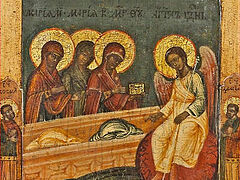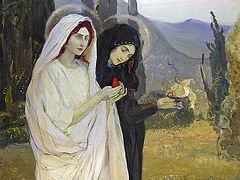The Reading from the Holy Gospel according to St. Mark. (15:43-16:8)
Today in the life of the Church we commemorate Joseph of Arimathaea and Nicodemus as well as the myrrh bearing women.
We are told that Joseph of Arimathaea was a man who was looking for the Kingdom of God. We typically gloss over these words quickly without reflecting on what this means. What does it mean when the gospel says that he was looking for the Kingdom of God? It means that he was pious and reverent. He loved God and sought to do His will in all things, as much as it was possible to do so. His thoughts, words and actions were directed towards serving the living God in the hopes of experiencing the Kingdom promised by the prophets that had come before. Of course, he did not really understand what that entailed, but he didn’t have to. He had faith that God would keep His promises, even if the righteous Joseph didn’t fully understand what was happening or what would happen.
I often tell you that we get used to hearing these stories and a possible downside of that is that they lose their ability to surprise us if we don’t engage them and go a bit deeper. We think it is just a basic detail that Joseph took the body of Jesus down from the cross, but it wasn’t. It was a very powerful act of faith. Think of it: Jesus was crucified as a criminal and potentially an enemy of Rome, as well as an enemy of the Jews. Joseph was himself a Jew and a member of the Jewish council called the Sanhedrin. This council was the highest Jewish authority in the land at that time. They were responsible for the legislative and judicial questions. They functioned like a cross between the senate and the supreme court. We believe that this council contained 71 members. Each of the men of this council were not just average Joes but the whose who of the Jewish world in that region at that time. These men were not anonymous but well known.
I am telling you all of this to paint a picture for the personality and faith and the utter courage that Joseph of Arimathaea demonstrated in going to Pontius Pilate and asking for the body of Jesus. He had very little to gain from an earthly perspective and so much to lose. Here was Jesus the crucified one who was hated by many of the Jews and perhaps the Romans and Joseph asks for permission to take down the body and wrap it respectfully and then goes above and beyond once again by offering up his own empty tomb that was going to be saved for his eventual death, and he gives up his future final resting place to honor the body of Jesus, whom he believed to be the messiah who was supposed to usher in the Kingdom of God. But what Joseph did wasn’t hidden. Everyone would have found out about it. Everyone would have known. If there had been any questions about what Joseph believed before, they would all be gone after that. Everyone would know that he loved Jesus. And he didn’t just love Jesus, he loved Him above anything else. St. John Chrysostom says,
“This was Joseph, who had been concealing his discipleship. Now he became very bold, after the death of Christ. For neither was he an obscure person nor unnoticed. He was one of the council, and highly distinguished, and as we see, courageous. For he exposed himself to death, taking upon himself the enmity of all by his affection to Jesus. He begged for the body and did not desist until he obtained it. Not only that, but by laying it in his own new tomb, he actively demonstrated his love and courage.” The Gospel of St. Matthew, Homily 88.
I wonder if our actions in life are courageous and show that we love Jesus? Are we ashamed to appear as Christians? Do we just try to blend in all the time? Do we hide what it means to be a Christian? Do we hide the teachings of Christ and His Church in order to blend in to the crowd and not cause waves? Are we more concerned with being liked than with honoring Christ? I ask these questions because it seems clear that in every persons life, there are times when you will be forced to do one or the other. We are pretty good about surfing the waves of change and walking the tightrope between our faith and our public appearance, but we shouldn’t expect that this will always work. There may be a day when we will be forced to choose between honoring God or honoring the world. Nearly every week we read stories of the martyrs who were forced or compelled to offer sacrifices to idols. Yet they did not because their faith in Christ gave them courage. Today there are people who want you to bow down to new idols and false ideologies, whether they be colored flags, or political ideologies or artificial intelligence.
One day you’ll have a difficult decision to make about whether to honor God or honor something else. I suspect that on that day, most of us will do whatever is consistent with the preparation of our hearts. Joseph sought to do God’s will, to be well-pleasing to God, to be faithful every day of his life. So on that day when he had to decide, he chose the path of integrity and faithfulness. His heart was prepared for this moment, no matter what it might cost him.
He was at risk of losing friends, influence, power and prestige. As Chrysostom says, he was even at risk of losing his life. But to Joseph, this was the right way to honor God and to show love to Jesus Christ. If this love is demonstrated by one who knew nothing of Christ’s resurrection, how much more love and faith should each of us demonstrate in light of Christ’s resurrection from the dead?
And Glory be to God forever AMEN.




